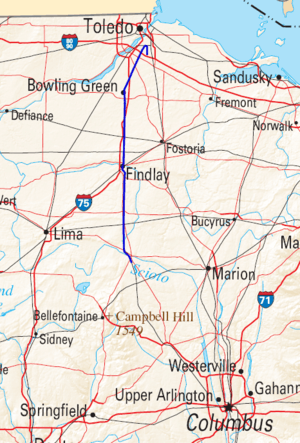CSX 8888 incident
 Route of CSX 8888 runaway train (starts at top, just south of Toledo, Ohio) | |
| Date | May 15, 2001 |
|---|---|
| Time | 12:35 p.m.[1] |
| Location |
Walbridge – Kenton, Ohio 66 mi (106 km) |
| Country | United States |
| Operator | CSX Transportation |
| Type of incident | Unmanned train |
| Cause | Operator error |
| Statistics | |
| Trains | CSX freight train |
| Crew | 0 |
| Deaths | 0 |
| Injuries | 1 |
| Damage | None |
The CSX 8888 incident, also known as the Crazy Eights incident, was a CSX Transportation freight train in the U.S. state of Ohio in 2001. Locomotive #8888, an EMD SD40-2, was pulling a train of 47 cars including some loaded with hazardous chemicals, and ran uncontrolled for two hours at up to 51 miles per hour (82 km/h).[2] It was finally halted by a railroad crew in a second locomotive, which caught the runaway and coupled to the rear car.[3]The incident also inspired the 2010 motion picture Unstoppable.[4]
As of 2017 #8888 is still in service, having been rebuilt and upgraded into a SD40-3 as part of a refurbishment program carried out by CSX.
Timeline

On May 15, 2001, a CSX engineer was using Locomotive #8888 to move a string of freight cars from one track to another within Stanley Yard in Walbridge, Ohio, CSX's primary classification yard for Toledo.[2] The string consisted of 47 freight cars, 22 of which were loaded. Two tank cars contained thousands of gallons of molten phenol, a toxic ingredient of paints, glues, and dyes that is harmful when it is inhaled, ingested, or comes into contact with the skin.
A 35-year veteran with a clean disciplinary record, the engineer noticed a misaligned switch and concluded that his train, although moving slowly, would not be able to stop short of it. He decided to climb down from the train, correctly align the switch, and reboard the locomotive.
Before leaving the cab, the engineer applied the locomotive's independent air brake. During mainline operation, he would also have applied the automatic air brake, setting the brakes in each of the train's cars. But, as is normal for intra-yard movements, the air brakes of the train were disconnected from the locomotive, and thus were not functional. Furthermore, applying the locomotive's brakes disabled the train's dead man's switch, which would otherwise have applied the train brakes and cut the engine power. The engineer also tried to apply the locomotive's dynamic brake, but failed to do so. He then set the throttle for the traction motors at 100%. If the dynamic brakes had been selected as intended, this throttle setting would have caused the train to slow down. However, since dynamic braking was not engaged, the setting caused the train to accelerate. Therefore, the only functioning brake was the air brake on the locomotive, and this was not enough to counteract its engine power.[1]
The engineer climbed down from the cab, then attempted to reboard the accelerating locomotive. He was unable to do so and was dragged about 80 feet (24 m), receiving minor cuts and abrasions. There were no other injuries or deaths resulting from the incident.

The train rolled out of the yard and began a 65-mile (105 km) journey south through northwest Ohio with no one at the controls.
Attempts to derail the train using a portable derailer failed and police shot at an emergency fuel cutoff switch, which had no effect because the button must be pressed for several seconds before the engine is starved of fuel and shuts down. A northbound freight train, Q63615, was directed onto a siding where the crew uncoupled its locomotive, #8392 (another EMD SD40-2), and waited for the runaway train to pass. #8392 had a crew of two: Jess Knowlton, an engineer with 31 years of service; and Terry L. Forson, conductor with one year's experience.[5] Together, they chased the runaway train. An EMD GP38 locomotive was prepared further down the line to couple to the front of the runaway to slow it further, if necessary.
Knowlton and Forson successfully coupled onto the rear car, and slowed the train by applying the dynamic brakes on the chase locomotive. Once the runaway had slowed to 11 miles per hour, CSX trainmaster Jon Hosfeld ran alongside the train, climbed aboard, and shut down the engine. The train was stopped just southeast of Kenton, Ohio, before reaching the GP38.[1] All the brake blocks on #8888 had been destroyed by the heat from being applied throughout the runaway trip.
The name of the engineer who let the train slip was never made public.
Preservation attempts
Several railway museums have tried to buy No. 8888, but CSX officials replied that they did not feel the locomotive worthy of preservation, and that it would be rebuilt as part of the SD40-3 rebuild program in late 2014 and early 2015.
References
- 1 2 3 Kohlin, Ron. "CSX 8888 Runaway Investigation". Kohlin.com. Retrieved 18 February 2015.
- 1 2 "Station: Stanley Yard, Ohio". Michigan's Internet Railroad History Museum. Retrieved December 17, 2015.
- ↑ "Runaway train stopped after uncontrolled 2 hours". CNN. May 16, 2001. Archived from the original on February 11, 2006. Retrieved February 24, 2007.
- ↑ David Patch (November 12, 2010). "At times, 'Unstoppable' goes off track from reality". Toledo Blade.
- ↑ Worden, Amy (November 12, 2010). "Pennsylvania man lived the drama that inspired 'Unstoppable'". Philadelphia Inquirer. Retrieved August 2014. Check date values in:
|access-date=(help)
External links
- Fox News Toledo story on Unstoppable, including video of 2001 incident
- "VHS Newsreel: Runaway Train In Ohio 2001". KC8WJG (YouTube). 2011-05-15. - Compilation of news items on the 2001 incident.